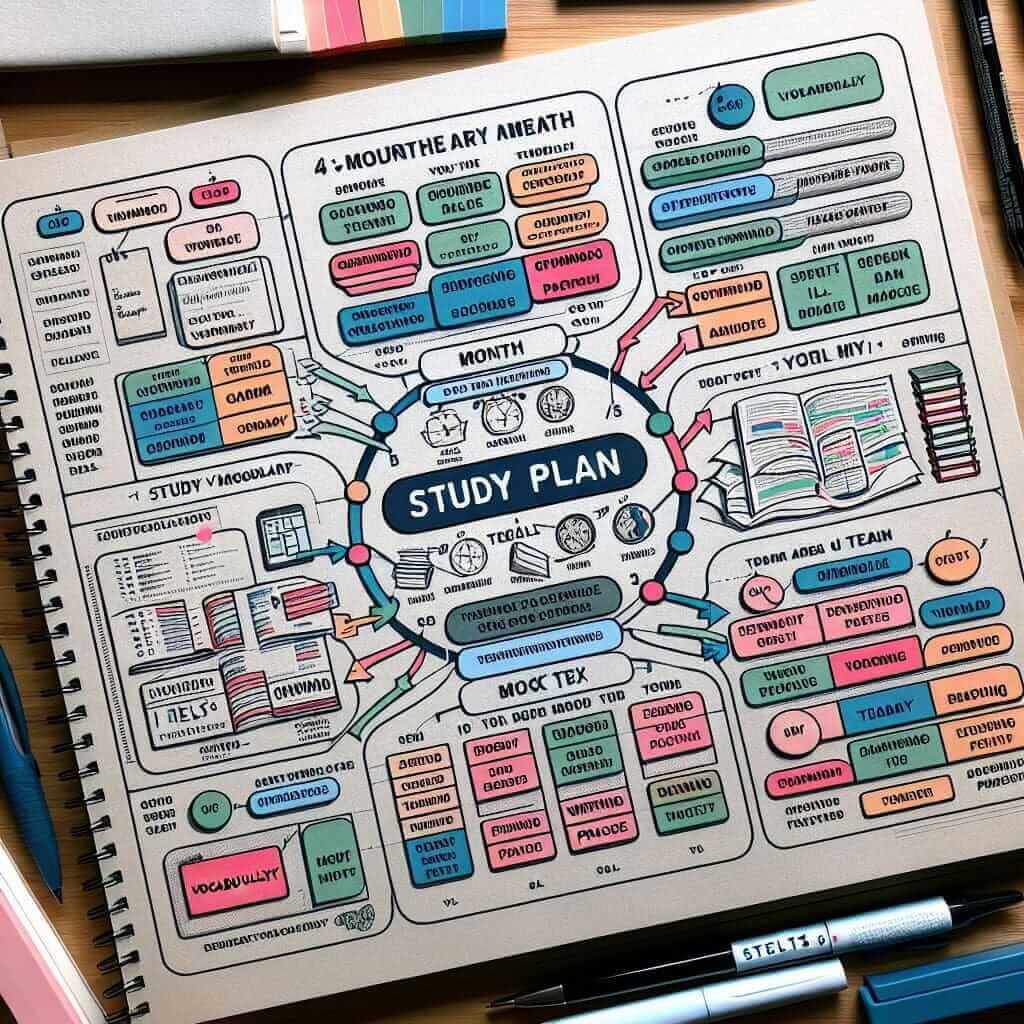Preparing for the IELTS exam in four months is a challenging yet achievable goal. With a well-structured study plan and consistent effort, you can significantly improve your English language proficiency and achieve your desired band score. This comprehensive guide will provide you with a step-by-step roadmap to effectively prepare for the IELTS within this timeframe.
Understanding the Task at Hand
“How to prepare for IELTS in four months” is a common query among IELTS aspirants. It reflects the urgency to prepare effectively within a limited time. To succeed, it’s crucial to understand:
- IELTS Exam Structure: Familiarize yourself with the four sections: Listening, Reading, Writing, and Speaking.
- Your Strengths and Weaknesses: Identify areas that require more attention.
- Time Management: Allocate sufficient time to each section based on your proficiency.
Crafting Your Four-Month IELTS Study Plan
Month 1: Laying the Foundation
- Focus: Building vocabulary and grammar proficiency.
- Activities:
- Vocabulary Enhancement: Learn at least 20 new words daily, focusing on common IELTS topics like education, technology, and the environment. Utilize flashcards, vocabulary apps, and context-based learning.
Example: Learn synonyms for common words like “important” (crucial, significant, vital) and practice using them in sentences. - Grammar Fundamentals: Review essential grammar rules, tenses, and sentence structures. Use grammar books, online resources, and practice exercises.
Example: Focus on understanding the correct usage of articles (a, an, the) and practice with exercises like: “I saw ___ interesting movie yesterday.” - Start Familiarizing Yourself with the IELTS Format: Take practice tests to understand the exam pattern and question types.
- Vocabulary Enhancement: Learn at least 20 new words daily, focusing on common IELTS topics like education, technology, and the environment. Utilize flashcards, vocabulary apps, and context-based learning.
Month 2: Honing Your Skills
- Focus: Developing test-taking strategies and improving your reading and listening skills.
- Activities:
- Intensive Reading Practice: Read English articles, newspapers, and books regularly. Focus on understanding the main ideas, identifying key details, and improving your reading speed.
Example: Read articles from reputable sources like The Guardian or BBC News and practice summarizing the main points in your own words. - Active Listening Practice: Listen to English podcasts, news channels, and documentaries. Pay attention to pronunciation, intonation, and understanding different accents.
Example: Listen to podcasts like “6 Minute English” or “The English We Speak” by the BBC to improve your listening comprehension and vocabulary. - Start Practicing IELTS-Specific Strategies: Learn techniques like skimming, scanning, and identifying keywords for the reading and listening sections.
- Intensive Reading Practice: Read English articles, newspapers, and books regularly. Focus on understanding the main ideas, identifying key details, and improving your reading speed.
Month 3: Mastering Writing and Speaking
- Focus: Enhancing your writing and speaking skills with a focus on IELTS-specific tasks.
- Activities:
- Writing Practice: Regularly write essays, reports, and letters following the IELTS format. Pay attention to grammar, vocabulary, coherence, and task response.
Example: Practice writing essays based on previous IELTS Writing Task 2 questions, ensuring you address all parts of the prompt and provide relevant examples. - Speaking Practice: Practice speaking English daily. Record yourself answering IELTS speaking prompts and analyze your performance for fluency, vocabulary, and grammar.
Example: Record yourself answering questions like “Describe a memorable event in your life” or “Discuss the advantages and disadvantages of technology” to improve your fluency and coherence. - Seek Feedback: Get your writing and speaking evaluated by experienced IELTS tutors or teachers for personalized feedback and areas of improvement.
- Writing Practice: Regularly write essays, reports, and letters following the IELTS format. Pay attention to grammar, vocabulary, coherence, and task response.
Month 4: Final Preparations and Mock Tests
- Focus: Fine-tuning your skills and building exam-day confidence.
- Activities:
- Full-Length Mock Tests: Take at least two full-length IELTS mock tests under timed conditions to simulate the actual exam environment.
- Analyze Your Performance: Identify your strengths and weaknesses from the mock tests. Focus on improving your weaker areas and reinforcing your strengths.
- Review and Refine: Go through your notes, vocabulary lists, and practice materials. Focus on areas where you still face challenges.
- Time Management Strategies: Develop and practice effective time management strategies for each section to avoid rushing or leaving questions unanswered.
Common Mistakes to Avoid
- Neglecting any of the four skills: Allocate equal time and effort to all sections.
- Relying solely on practice tests: Balance practice tests with focused skill development.
- Ignoring feedback: Actively seek and act upon feedback to identify and address weaknesses.
- Cramming at the last minute: Consistent effort over time yields the best results.

Conclusion
Preparing for the IELTS in four months requires dedication and a strategic approach. By following this comprehensive guide, consistently putting in the effort, and seeking feedback, you can significantly enhance your English language skills and achieve your desired band score. Remember to stay motivated, maintain a positive attitude, and enjoy the learning process. Good luck with your IELTS journey!